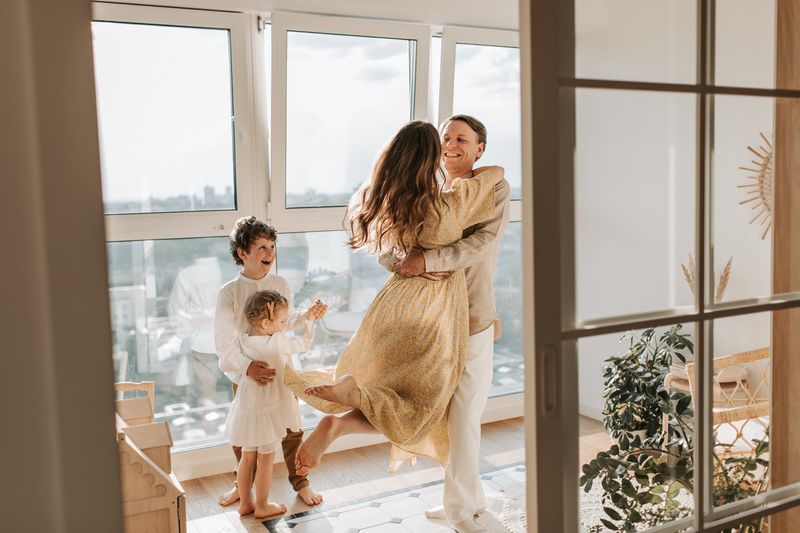Contrary to tired stereotypes, husbands aren’t emotionally clueless. They crave connection. They feel deeply. And when something’s missing in the marriage, they often won’t say it out loud—they’ll just feel it silently. Here’s the truth: Most men don’t need over-the-top praise or dramatic declarations.
Precisam de consistency, warmth, and to be seen for who they really are—not just for what they provide. Let’s talk about the 15 things husbands actually need to feel happy in marriage, and the 5 sneaky mistakes that often leave them feeling invisible—even when the love is there.
1. Emotional Safety
Ever notice how your husband breathes easier when he knows he won’t be judged? That’s emotional safety working its magic. It’s the comfort of admitting fears or worries and not getting a lecture in return.
Honestly, it’s about offering a soft place to land—a vibe that says, “Your feelings are safe here.” When he senses that, he’ll actually open up more, not less. I’ve seen it: trust brings honesty, and honesty brings closeness.
If he knows he won’t get shamed or “fixed,” he’ll bring his true self to the table. That’s the foundation for all the good stuff—connection, laughter, even intimacy. Give him that space, and watch him relax into the partnership.
2. Genuine Respect
You know what? He just wants you to believe in him. Real respect isn’t just nodding along; it’s truly valuing his perspective—even when you disagree. When his efforts are acknowledged, it makes him feel like he matters.
He isn’t asking for a parade every time he takes out the trash. But respecting his style—whether it’s how he tackles problems or chooses to unwind—goes a long way. Kind words, a thoughtful look, or trusting his decisions tell him he’s seen.
Respect doesn’t mean blind agreement. It means his voice holds weight in your world. Letting him lead sometimes, supporting his intuition, or simply listening with an open heart—these moments linger long after the dishes are done.
3. Words of Appreciation
A simple “thanks for grabbing groceries” can turn his whole day around. Husbands may not always say it, but those little acknowledgments are like secret love notes for their soul.
Appreciation doesn’t have to be grand. It’s the noticing—the “I saw what you did and it mattered to me.” The more specific, the better; “I appreciate how you handled bedtime with the kids” beats a generic “good job.”
What’s wild is how these moments stick. He’ll replay your kindness in his head, especially on tough days. A crumb of gratitude, offered regularly, is a game-changer. Be generous with it, and you’ll see him stand a little taller.
4. Affection That’s Not Just Physical
Quick peck on the cheek while passing in the hallway? Total mood booster. Husbands need affection that isn’t always a prelude to something more—it’s about feeling loved, not just desired.
Sometimes it’s as small as a hand on his back or a playful nudge during a shared joke. These little moments of touch remind him he’s cherished, not just needed for chores or bills. It builds a steady warmth between you two.
Physical affection grounds the relationship. It’s a steady drumbeat of “I’m glad you’re here.” Even if you’re not a touchy-feely person, a genuine gesture now and then does wonders for his sense of belonging.
5. Feeling Desired—Not Just Needed
Ever catch your husband lighting up when you flirt with him? That’s not just ego—it’s about feeling wanted, not just tolerated or needed. There’s a big difference between “I need your help” and “I want you.”
He loves when you reach for his hand first, or sneak a wink across the dinner table. It gives him a boost, especially if things feel routine. Desire goes beyond attraction; it’s about letting him know you still choose him, and not out of habit.
This kind of attention doesn’t require grand gestures. Just a little spark—a shared look, a whispered compliment—can make him feel like he’s more than a roommate or co-parent. That’s gold.
6. Laughter and Playfulness
Life may be heavy, but laughter can turn an ordinary night into your own inside joke. When you both let your silly sides show, something special happens—walls come down.
A quick tickle fight, a shared meme, or that dumb dance you do in the kitchen—these moments matter. Husbands crave that playfulness just as much as deep talks or romance. It’s how stress melts and memories are made.
A relationship that laughs together feels lighter, even when life’s messy. It doesn’t mean ignoring problems, but finding the joy in small moments. One unfiltered giggle says, “We still get each other.”
7. Freedom to Be Flawed
Nobody wants to tiptoe around their own house. When your husband knows he can mess up—forget a birthday, burn the toast—and still get a hug, that’s freedom.
He’s not looking for a critic. He wants to know you see the whole messy, lovely picture. When you crack jokes about your own disasters, it gives him permission to be real too. Suddenly, mistakes aren’t disasters—they’re stories you’ll laugh about later.
Being able to show his imperfect self means he can relax. You get the real him, not just a polished version. That’s where true closeness lives, right in the middle of the chaos.
8. Shared Goals (and a Future Vision)
Remember when you used to talk about “someday”? Husbands need to know that dream hasn’t faded—that you’re both still looking ahead, not just stuck in laundry and bills.
Maybe it’s planning a trip, saving for a home, or simply deciding what you want your next chapter to look like. When you’re both aiming for the same horizon, it builds unity. Even if you disagree, the effort to dream together is what counts.
These conversations don’t have to be big or serious. Small hopes matter. Checking in about future plans tells him, “We’re a team—still building something together.”
9. Time to Recharge Without Guilt
Here’s a secret: sometimes, your husband just needs to retreat. Maybe it’s tinkering in the garage or zoning out with a video game. That alone time isn’t a rejection—it’s refueling.
A chave? Giving him space without the guilt trip. It’s not about escaping you—it’s about resetting his brain. When he can recharge guilt-free, he comes back more present, more patient, and honestly, more himself.
Offer that hour and don’t count the minutes. Everyone needs a breather. When he feels you understand his need to unplug, he’ll value your partnership even more.
10. Support in Stress—Not Solutions
Ever tried to fix a problem your husband wasn’t asking you to solve? Sometimes, what he really wants is a safe ear, not a pep talk. Just “That sounds tough. I’m here.”
We rush to fix things for people we love, but often, he just needs to vent. No judgment. No advice unless he asks. That kind of support feels like a weight lifted.
Showing up without jumping into action says, “I trust you to handle it, but I’ve got your back.” It builds a quiet confidence between you—a sense that, together, you can face whatever comes next.
11. Trust Without Micromanagement
Nothing kills confidence like constant correction. Husbands need room to do things their way—yes, even if it’s not how you’d do it.
Letting him handle the grill, the bills, or the bedtime story without micromanaging builds trust. He feels respected and trusted, not doubted. That space lets him show up fully, quirks and all.
Micromanagement feels like a silent vote of no-confidence. A little freedom speaks louder than a thousand checklists. When he’s trusted, he’ll usually rise to the occasion (and maybe even surprise you).
12. A Safe Place to Land
After battling the outside world, coming home should feel like exhaling. Husbands need a space where they aren’t bracing for the next critique or complaint.
It’s not about perfect decor or gourmet meals—it’s the emotional tone. Warm welcomes, a quick smile, or just a moment of calm make all the difference. That sense of “I’m glad you’re home” is priceless.
Your home becomes his sanctuary. When he feels safe, he can truly rest and reset. It’s not about ignoring issues, but about making the home a place he wants to come back to.
13. Being Included Emotionally—Not Just Logistically
Ever catch yourself delegating chores but forgetting to ask how he’s really doing? Husbands crave being included in your emotional life, not just the family logistics.
Ask for his thoughts, his feelings, not just his help. “How did that make you feel?” means more than “Can you pick up the milk?” It’s about letting him into the heart stuff, not just the to-do list.
When he knows you care about his opinions and emotions, he feels like a true partner. That’s the glue that keeps you close, even when life gets busy or complicated.
14. Intimacy That Feels Mutual, Not Transactional
When intimacy becomes another thing to check off, it loses its magic. Husbands want to feel desired, not like it’s a chore or an obligation.
Mutual intimacy means both partners feel wanted. It’s caring, spontaneous, and rooted in love—not a reward for doing the dishes. That warmth lingers long after the lights go out.
When you’re truly present, even quiet moments can feel intimate. Letting go of pressure creates space for closeness. It builds the kind of bond that makes everything else a little easier.
15. Feeling Like He’s Still Chosen
Nothing beats the feeling of being picked—over and over. Husbands want to know they’d still make the cut, even after years, messy routines, and a mountain of laundry.
It’s not about competition—it’s about reassurance. A simple “You’re still my person” (or even a goofy inside joke) earns more points than any fancy date night. These reminders build security.
Show him he’s not just your default, but your choice. When he feels chosen, he stands taller, loves harder, and leans in. That’s how long-term love stays fresh.
16. Only Acknowledging What He Does, Not Who He Is
“Thanks for fixing the sink” is nice, but “I love your patience when things go sideways” truly lands. Husbands are more than their task lists—they’re whole people with quirks and gifts.
When you see him for his character—his humor, his curiosity, his gentle way with the kids—it fills a deeper need. He wants to be valued for who he is, not just what he checks off.
Next time, say something about his spirit. You’ll notice the way he lights up when he feels truly seen. Those are the compliments that stick.
17. Constant Critiquing in the Name of “Helping”
You think you’re being helpful—offering advice, correcting, giving tips. But constant critiquing feels like a slow drip of disapproval.
When a husband gets more pointers than praise, he starts to feel like a project. That wears him down. He’s not looking for perfection, just acceptance, even if his way takes longer or looks different.
Try swapping a correction for a laugh or a hug. Sometimes, letting things be “good enough” brings more peace. Marriage isn’t a home improvement show—give each other a little grace.
18. Withholding Affection Until Everything Else Feels Perfect
When love becomes conditional—“I’ll hug you when you… ”—the emotional gap grows. Husbands sense when affection is withheld, and it stings more than you’d think.
Affection shouldn’t be a prize for good behavior. It’s the glue that keeps couples close, especially on rough days. When warmth disappears, so does the safety net.
Break the habit of waiting for perfection. Reach out, even on tough days. A simple touch can start to bridge the emotional distance, no matter what’s left on the to-do list.
19. Always Putting the Kids First—Every Time
Kids are important—no question. But a marriage where the husband always comes last becomes lonely for both partners.
When your husband feels like background noise to the never-ending kid chaos, he’ll eventually stop showing up emotionally. Carving out couple time isn’t selfish; it’s how you keep the spark (and sanity) alive. Even a quick check-in after bedtime matters.
Remember: you were a couple before you were parents. Protect that bond. When he feels prioritized, he has more to give—at home, and to the kids too.
20. Not Asking Him What He Needs—And Assuming You Know
We all think we know our partner best. But sometimes, we miss the mark by not asking. Husbands may not always volunteer their needs, but that doesn’t mean they don’t have them.
Asking directly—“What makes you feel loved?”—isn’t awkward, it’s caring. When you make space for his truth, he’ll often surprise you with what matters most.
Skip the mind-reading. Open the conversation, then really listen to his answer. You might find a new way to connect that you’d never considered before.





















